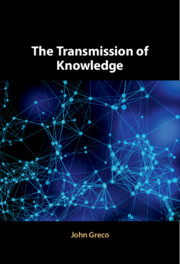Book contents
- The Transmission of Knowledge
- The Transmission of Knowledge
- Copyright page
- Contents
- Preface
- Acknowledgments
- 1 Introduction
- 2 The Framework Presented
- 3 Joint Agency and the Role of Trust in Testimonial Knowledge
- 4 Social Norms and Social Sensibilities
- 5 A Unified Account of Generation and Transmission
- 6 The Framework Extended
- 7 Education and the Transmission of Understanding
- 8 Reductionism and Big Science
- 9 Social Religious Epistemology
- Appendix: The Garbage Problem
- Bibliography
- Index
3 - Joint Agency and the Role of Trust in Testimonial Knowledge
Published online by Cambridge University Press: 21 August 2020
- The Transmission of Knowledge
- The Transmission of Knowledge
- Copyright page
- Contents
- Preface
- Acknowledgments
- 1 Introduction
- 2 The Framework Presented
- 3 Joint Agency and the Role of Trust in Testimonial Knowledge
- 4 Social Norms and Social Sensibilities
- 5 A Unified Account of Generation and Transmission
- 6 The Framework Extended
- 7 Education and the Transmission of Understanding
- 8 Reductionism and Big Science
- 9 Social Religious Epistemology
- Appendix: The Garbage Problem
- Bibliography
- Index
Summary
Chapter 3 develops the information economy framework by invoking two additional resources: the concept of a speech-act from philosophy of language, and the concept of joint agency from action theory. The chapter also vindicates a prominent anti-reductionist theme: that the interpersonal relation of trust plays an essential role in testimonial knowledge. The central idea is that knowledge transmission essentially involves a kind of joint agency, characterized by a special sort of cooperation between speaker and hearer, and that joint agency essentially involves relations of trust between the cooperating agents. In addition, it is argued that the kind of joint agency involved in knowledge transmission essentially involves the speech-act of “telling.” The central idea is that a successful telling requires that the speaker intends to pass on knowledge to the hearer, and that the hearer understands that this is the speaker’s intention. It follows that a successful telling involves the kinds of “shared intention” and “common understanding” that are a characteristic of joint agency.
Keywords
- Type
- Chapter
- Information
- The Transmission of Knowledge , pp. 47 - 67Publisher: Cambridge University PressPrint publication year: 2020

